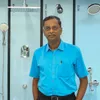Started in a small workshop, this family business is now a leading rice milling machinery brand
Sona Foods, now renamed Sona Machinery, started from a workshop in Delhi. Today, it is a manufacturer, exporter, and supplier of milling equipment for rice processing and cleaning dal, wheat, sesame, millet, gram, lentils, maize, and corn.
In 1995, Narender Kumar spent most of his time in his small workshop in the lanes of an industrial area in New Delhi. In the workshop, he built rice milling equipment and machines and sold them to small, home-grown millers.
His business, Sona Foods, steered clear of large millers that international rice milling machine brands such as Buhler catered to. This was because Buhler used advanced sheet-metal technology and laser cutting tools that were hard to come by.
Over the years, Narender and his son Vasu Naren have grown the business into a manufacturer, exporter, and supplier of milling equipment for rice processing, cleaning pulse-dal, wheat, sesame, millet, gram, lentils, maize, and corn with a specialty in rice milling machinery.
In 2007, the business moved out of the workshop to a manufacturing facility in Tronica City, Ghaziabad, UP. It was also renamed as .
Vasu, Director and CEO of the family business, says:
“We identified untapped markets in North India and have become a synonym for rice mill machinery manufacturing. Sona Machinery has around 7,000 installations across the country. We believe our market share is between 60 and 70 percent in India’s branded rice milling equipment market.”
Vasu does not disclose the company’s annual revenues, but says that Sona’s has a loyal and trusted client base and channel partner network spread across India and abroad.

Sona Machinery's paddy husker
In an exclusive interview with SMBStory, Vasu and Mukesh Panchal, Director, Growth and Operations, describe how the business grew into a leading brand for rice mill machinery manufacturing and layout the plans for the future.
Edited excerpts from the interview:
SMBStory [SMBS]: How did your father Narender Kumar start Sona? And when did you join the business?
Vasu Naren [VN]: My father bootstrapped the business with his own savings and started it in a workshop in New Delhi. There was not much information or awareness about the largely unorganised milling market back then.
He always maintained a low profile and began building the business gradually. Sona picked up steam after I joined in 2012 and put in place some growth plans. We moved to a larger manufacturing unit with modern machines and additional labour.
These additional resources helped us manufacture machines at mass level.
SMBS: What are the challenges you faced along the way?
VN: We make rice milling machines but because we serve the agricultural sector; this means we bow to the whims of the monsoon. Good rains mean bumper harvests, and mills will hum with activity, thus generating demand for rice milling equipment.
Conversely, if the monsoons are off schedule, there is the issue of how much money rice millers can spare to buy equipment. We cater to the low and mid-segment millers who in such cases often turn to banks for loans. But most banks are saddled with bad loans, and don’t give credit easily.
We are now thinking about ways to make credit available to millers. The economics of these milling machines are compelling because the returns come in less than two years.
SMBS: How did Sona diversify into different categories of agri-processing equipment?
VN: When my father started the business he made only rice milling equipment. Over the years, we have broadened the range of machines in the agri-processing industry and now we also manufacture soya and maize mills and plants to process pulses.
Presence of local dealers, availability of spare parts including consumables, and a pan-Indian service network provides us an edge. This has helped us dominate a segment that once relied solely on less organised and hyper-local suppliers with no guarantee of after-sales support.

Sona Machinery's sliky polisher
SMBS: What is the USP of the products?
VN: We make custom rice milling plants and processes that fits customers’ resources and market trends. We also support them throughout the entire lifecycle of the mill.
Rice mill machinery varies from the capacities of three to eight tonnes per hour (TPH). Equipment for handling bulk material up to 100 TPH and preparation of all types of value-added products in soya like hi-pro, normal and edible is also taken care by Sona Machinery.
Products pertaining to pre-Milling activities of cleaning and material handling for pulses and spices are also looked after by us.
SMBS: Who are your competitors and how are you staying ahead of them?
Mukesh Panchal [MP]: Our competitors are Satake India Engineering, AGI Milltec and Buhler India. We believe the future belongs to manufacturers who recognise uncertainties and initiate their operation efforts and look for the ideas that will make them more competitive.
Our efforts to maintain quality, efficiency in operation, production-centric research and development, and reduced power and manufacturing cost has been able to reduce the processing cost while maintaining quality.
SMBS: How is the business recovering from the impact of the COVID-19 pandemic and lockdown?
MP: 2020 was tough and our forward planning is still in the early stages. We have started with workforce-related solutions through ongoing communications with workers (including those who returned to their home state), setting up buddy systems and engagement with industrial training institutes and hiring of temporary workers on a walk-in basis.
We have also worked on measures such as the installation of sanitisation tunnels, pre-restart fumigation of factory premises and rearrangement of work stations to maintain physical distancing.
SMBS: What are the future plans for the company?
MP: We are open to whatever opportunities the future may hold and we are flexible and adaptable.
We are looking to consolidate our presence in India and expand overseas. We are in dialogues to join hands with an European manufacturer to provide an integrated solution for them. We are also expanding our premium range of existing machines.
We will also continue to provide training and apprenticeships in the motor industry, business administration, management, sales and customer service, warehousing, and storage to our employees to meet client expectations.
Edited by Teja Lele









